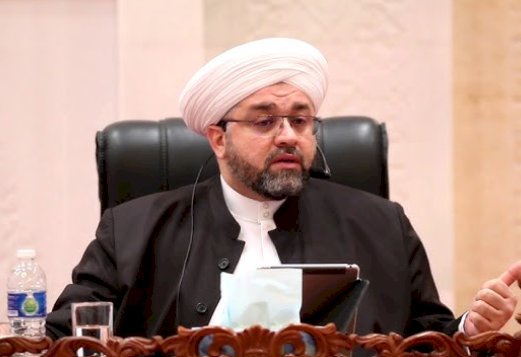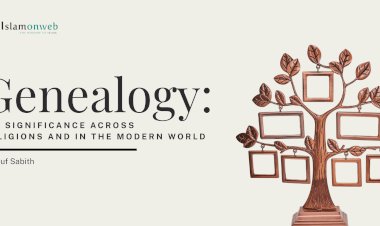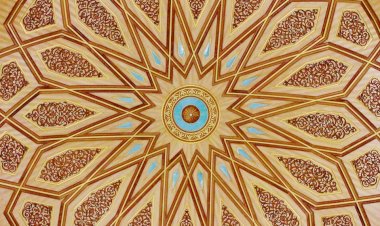Journeying through the depths of knowledge and acquiring wisdom is indeed highly virtuous. For those of us who are preachers of the holy religion, it is a duty. "Read in the name of your Lord who created" (Al-Alaq 96:1) – this divine command urges those who seek knowledge to awaken. Notice that the Qur'an does not say "remember (udkur)," but rather "read (iqra)." This usage reveals the greatness of knowledge.
The significance of knowledge can be categorized into three aspects: one, Understanding that the supremacy of knowledge is granted through the Creator.
Two, The honor of the seekers of knowledge.
Three,Guiding others who seek knowledge.
If a believer embraces these three aspects, they will be enriched with the goodness recorded in the pages of virtuous deeds.
For a seeker of knowledge, sitting in the company of a teacher is of utmost importance. Through the guidance of enlightened teachers, it is possible to bring divine light, spirituality, and discipline into the dark heart. The saying, "If it weren't for a teacher (murabbi), I would not have known my Lord," emphasizes the importance of teachers and how they bring us closer to the Creator. When the Almighty wishes good for a person, He leads them to the company of scholars in the religion. As we draw closer to our teachers, their characteristics, virtues, spiritual awakenings, and ways of life will also manifest in us.
Thus, what I have to say is that it is not just the collection of knowledge that we gain through the proximity of a teacher, but also the structure and discipline needed to pass that knowledge on to others. Ibn Ajeeb (RA) said: "I prayed a lot, lived away from people, and recited the Qur'an. But it was not until I lived with the scholars that I could truly appreciate the sweetness of knowledge (Sharh al-Hikam)."
This statement makes it clear that to attain true knowledge, one must walk the path of knowledge through the guidance of teachers. My master, Sayyid Abdul Qadir Gilani (RA), who was born in Hijri 470, completed his primary studies in his homeland and set off for Baghdad at the age of eighteen. No one knew him at that time, but by the age of fifty-five, he had gained immense knowledge through the finest teachers in Baghdad, becoming widely known as a scholar. Scholars like Imam Ghazali (RA), Junaid al-Baghdadi, and Sayyid Ma'ruf al-Karkhi rose to prominence because of their teachers.
For someone seeking knowledge, piety (taqwa) is essential. "O you who have believed, fear Allah and be with those who are truthful" (Tawbah 9:119) – this Qur'anic teaching highlights the importance of spiritual purity. Imam Ahmad ibn Hanbal (RA), a scholar of Hadith, would often visit the Sufi master Ma'ruf al-Karkhi (RA), kiss his hand, and seek blessings. When his disciples asked why he would visit Ma'ruf al-Karkhi (RA), they wondered if he had knowledge. Ahmad ibn Hanbal (RA) responded: "The mother of all knowledge is taqwa. He (Ma'ruf) possesses it, which is why I visit him."
In another instance, when asked, "What is taqwa?" the Prophet ﷺ pointed to his heart and said, "It must be here" (Muslim). These words of the Prophet ﷺ and the history of Ma'ruf al-Karkhi emphasize the necessity of spiritual purity.
A student thirsty for knowledge must uphold istiqama, i.e., adherence to divine commands. Once, a disciple of Gilani (RA) sought the reason for the Sheikh’s greatness but found nothing extraordinary in his observations. The disciple then asked Gilani (RA), "What is the reason for your greatness? I observed you, but found nothing." Gilani (RA) responded: "Did you ever see me neglect my prayers? Break my fast? Sever ties with family? Fail to help the poor?" The disciple replied, "No, I have always seen you as righteous and upright in all deeds." Gilani (RA) then said, "This is the reason for my greatness: istiqama. Those who remain steadfast in the commands of the Lord will have their names written among the exalted."
This history shows us that living according to Allah's commands is key. "So remain steadfast as you have been commanded, you and those who have turned with you to Allah, and do not transgress. Surely He sees everything you do" (Hud 11:112). Acts done in defiance of Allah are futile. I repeat, istiqama is far more fruitful than a thousand miracles. Miracles may attract people to you, but if you want Allah to be attracted to you, you must follow His commands and be among the grateful servants.
Only through sincerity, proximity to teachers, and istiqama can knowledge be firmly planted in the heart. It is only when these qualities are present that what has been planted will grow and bear fruit.
This is a translated version of Sheikh Afifuddin Jilani's lecture.
About the orator
In 1972, Sheikh Sayyid Afeefuddin Jeelani, the 19th descendant of Sheikh Abdul Qadir Al Jeelani, was born in Baghdad. He currently resides and teaches in Kuala Lumpur, Malaysia. He is the founder of the Al Wariseen Trust and the chief advisor of Darul Gilani International.
Translation : Shamil Chullipara

























Leave A Comment